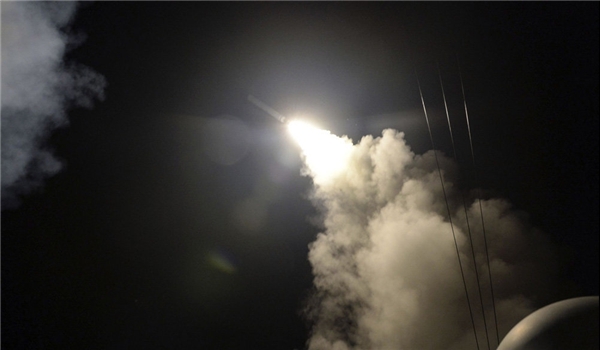
RNA - Strange enough, President Donald Trump ordered the airstrikes as a team of experts from the Organization for the Prohibition of Chemical Weapons was about to arrive on Saturday to determine whether a chemical weapons attack had even occurred!
The US-led military aggression would no doubt complicate the OPCW mission. Many suspect that the timing of the US-led attack was intended to prevent the team from gathering evidence to prove whether or not chemicals were used. The OPCW does not assess blame though. However, there are at least five takeaways from this latest development in a long-running and complex conflict with consequences far beyond Syria itself - including in the United States, Iran, Russia and other parts of Europe:
1- The war on Syria is drawing to an end. There will be mess, but the outcome is clear. The ISIL, along with the Qaeda-linked Salafists and Wahhabis the US, Saudi Arabia and Israel financed and armed, are headed into history. Syria will remain intact - averting, if narrowly, failed-state status. The peace talks Iran, Russia and Turkey have sponsored is also working. In effect, all is positive, although there are still some implications to consider.
2- The suspicious strikes came following a trip by Saudi Prince Mohammed bin Salman to the US, the UK and France, during which he signed contracts worth billions of dollars with tech moguls and arms manufacturers “in order to create a bulwark against Iran.” While on the three-week US tour, Salman said the US should maintain its military presence in Syria to prevent Iranian expansion in the war-ravaged nation, a day after US President Donald Trump stated that the United States would pull out of Syria very soon, and “Saudi Arabia might have to pay if it wants continuing US presence in Syria.” Trump further argued, “We spent $7 trillion in the Middle East. And you know what we have for it? Nothing.”
3- During the seven-year conflict, the Syrian Army transformed itself from a traditional military built on the former Soviet model into an effective counterinsurgency force. And with sustained military support from Russia and Iran, and the guerrilla warfare expertise of its ally, Lebanon’s Hezbollah, it regained ground almost everywhere in the war-torn country. Syria’s armed forces continue to battle rebel groups ranging from the mainstream Free Syrian Army to Al-Qaeda’s Syria affiliate the Nusra Front and the Wahhabi-Takfiri ISIL militants. The power of the Syrian army has increased qualitatively and quantitatively, and as a consequence, the US and its terror proxy forces have lost control of large parts of Syria. These successes have been partly the result of a shift to the close-quarters guerrilla warfare in which Hezbollah specializes. Despite having the state-of-the-art warfare technology, experts see little chance the US and company will be able to recapture all the territory they have lost, much less affect regime change in Damascus.
4- Western governments are acknowledging that the unthinkable has become a reality; that Russia has emerged as a great military power, and its economy is far from being “in tatters”. Thanks to its timely military interventions in Ukraine and Syria, Russia is now emerging as a prospective great power challenging the West. On the other hand, former great powers, such as Germany, France, England, and the US itself are now no longer major powers. Simply put, this is a country that just won't go away. That’s why the US avoided targeting the Russian army in the Saturday strikes. In the grand of scheme of things, the warmongers wanted to avoid hitting Russian targets and its unintended consequences after Russia vowed to shoot down incoming US missiles.
5- Last but not the least, both Russia and the US seem to want to avoid an escalation - for now. Washington and Moscow have had some close calls in Syria, but so far they have avoided a serious altercation. However, it’s not a given that continued military operations to appease Saudi Arabia, Israel and terror proxies like the one on Saturday, plus unintended casualties like killing Russian soldiers if they are near the target the US wants to strike, wouldn’t be a provocation.
According to Fars News Agancy, the question is, can the US and Russia avoid getting into a broader fight after the US launches missiles at Syria on yet another chemical attack pretext, even if neither side wants this? The recent military operation by the US, the UK and France told us that nothing is risk-free in Syria.
847/940